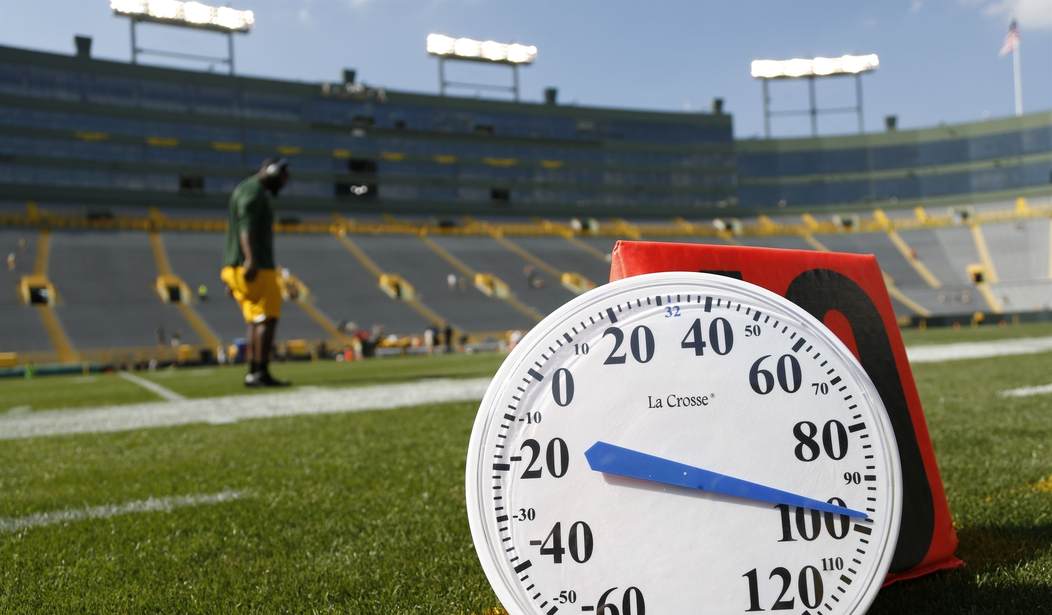Earlier this week, depending on where you live, you may have noticed a bit of a heat wave during your 4th of July celebrations. But as Bege pointed out on Thursday, simply noting that it was a hot day in July wasn’t good enough for the climate cult members in the legacy media. They dredged up “experts” to declare that Tuesday and Wednesday were the “hottest days on record” if not the “hottest days ever.” It was such a peculiar story that others began digging into the details to see if there was any merit to the idea or if it was all malarkey. At the Wall Street Journal, Steve Milloy of the Energy and Environment Legal Institute dug even deeper. As you might have expected even without burying yourself in reams of scientific studies, those claims were largely meaningless and, frankly, “preposterous.” We’re talking about fractions of a degree and measurements that vary wildly depending on the location being measured. (Subscription required)
One obvious problem with the updated narrative is that there are no satellite data from 125,000 years ago. Calculated estimates of current temperatures can’t be fairly compared with guesses of global temperature from thousands of years ago.
A more likely alternative to the 62.6-degree estimate is something around 57.5 degrees. The latter is an average of actual surface temperature measurements taken around the world and processed on a minute-by-minute basis by a website called temperature.global. The numbers have been steady this year, with no spike in July.Moreover, the notion of “average global temperature” is meaningless. Average global temperature is a concept invented by and for the global-warming hypothesis. It is more a political concept than a scientific one. The Earth and its atmosphere is large and diverse, and no place is meaningfully average.
Milloy punches one hole after another in the entire parade of hysteria, including the 125,000-year theory. Temperatures around the planet are constantly in flux and known trends are frequently ignored by climate alarmists because of their inconvenient nature. For example, “average” temperatures are always higher in the northern hemisphere during its summer than in the southern hemisphere during the opposite three-month period. Why? Because there’s a lot more dry land capable of soaking up sunlight in the north while a larger percentage of the southern hemisphere is covered by oceans.
Milloy also takes a dive into the problems of the instrumentation being used. That’s a topic we’ve covered here before. The vast majority of the thermometers being used by NOAA are improperly installed and produce corrupted readings that skew almost entirely to the side of producing warmer records. And the satellite temperature measurements relied on for many of their readings are spotty at times.
It’s also worth asking if these people ever grow tired of being wrong. Going back to the 90s, we were repeatedly warned by everyone from Al Gore to Greta Thunberg that if we didn’t take away everyone’s cars immediately, all of the polar sea ice would be gone in five, seven, or ten years. Those clocks have all run out and the artic ice pack is actually growing, despite the climate alarmists’ best efforts to explain the phenomenon away. The Antarctic pack is breaking up in places, but there’s still a lot of ice.
Here’s another fun factoid that was pointed out to me recently involving all of the screaming about carbon dioxide emissions. Without doing any sort of searching, what would your guess be as to what percentage of the planet’s atmosphere is made up of carbon dioxide? I’m no scientist, and I will confess that when I was asked, I hazarded a guess of 5 percent or so. But it turns out that CO2 and methane are part of the “trace gases” that make up 0.04 percent of the atmosphere. That’s four one-hundredths of one percent. Our atmosphere is nearly 80% nitrogen and a little less than 20% oxygen. And that 0.04 percent carbon dioxide is all the plants have to live on. (And produce more oxygen for us.) If the level drops below 0.02%, all of the plants start dying and then we’re all extinct.
But that’s not going to stop the “Hottest Day Evah” people. You’re not supposed to pay attention to science. You’re supposed to Follow The Science. Best of luck with that to all of you. I’m going to go fire up my gas grill for some burgers before the FBI arrives.








Join the conversation as a VIP Member